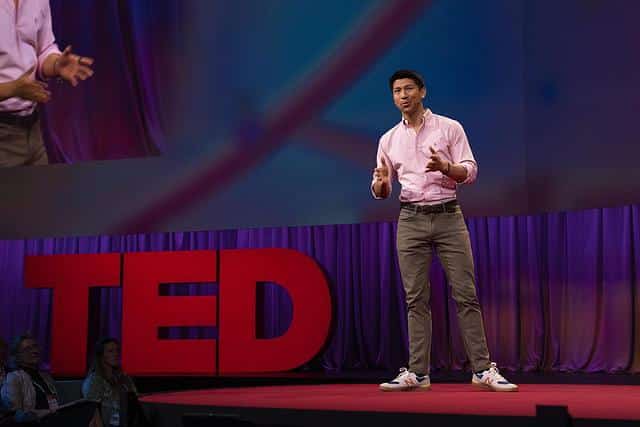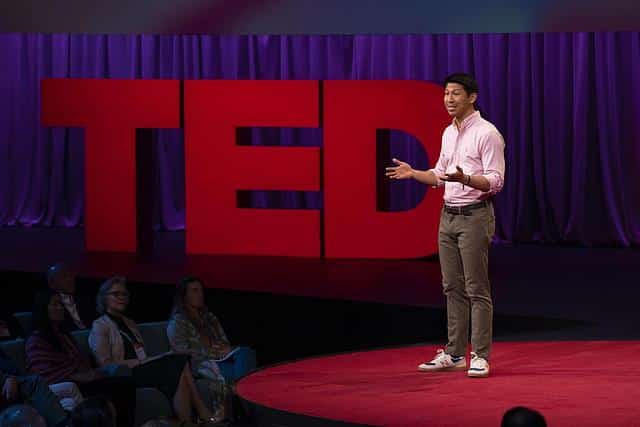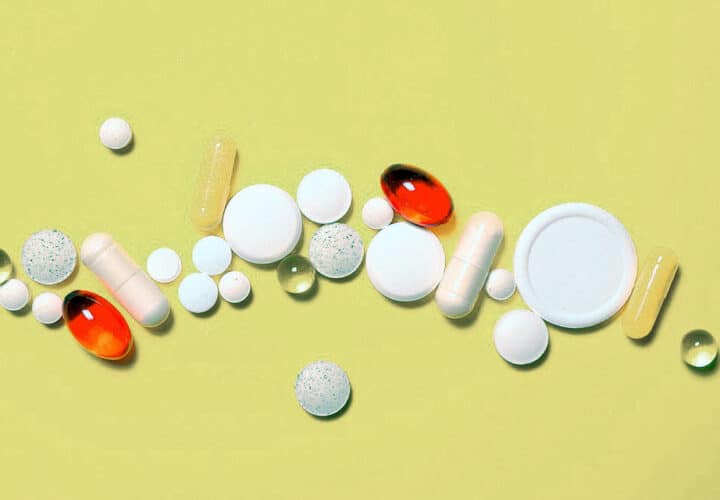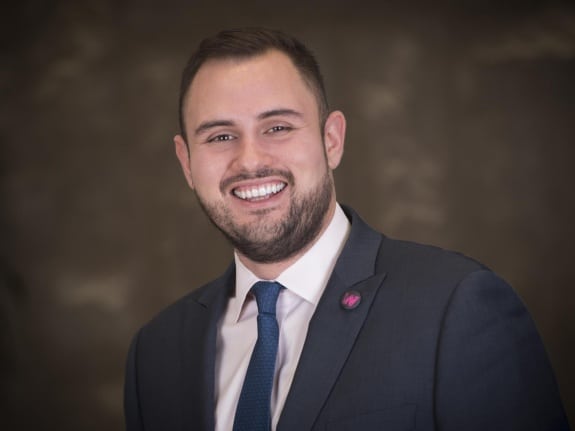Healthcare industry disruptor and Radicle Science CEO Dr. Jeff Chen is reimagining clinical trials to give natural products — like valerian root and ginseng — a fighting chance against big pharma.
As Dr. Jeff Chen MD, MBA recalled in a recent talk at the 2023 TED Conference in Vancouver, BC, when he was a medical student at UCLA, one of his patients was a young boy suffering from dozens of seizures every day. The patient’s family was going bankrupt, Chen said, paying out of pocket for a cocktail of pharmaceutical drugs that had little benefit.
“Between the side effects is constant seizures,” Chen said, “this boy was wasting away.” But one follow-up visit, the family arrived and the boy’s condition had suddenly, dramatically improved. Chen said the patient was nearly seizure-free, and for the first time at the age of 10, was going to school. Chen said the patient’s mother attributed his improvement to a regimen not of prescription drugs, but of natural products.
This seeming miracle-cure scenario isn’t really within grasp for the average patient. The market for natural products isn’t regulated by the FDA nor any other regulatory body. Often, they lack objective, credible scientific studies to validate the approaches they follow, and because they’re unregulated, there aren’t just efficacy concerns but safety concerns about the ingredients they contain. Supplement makers can make wild, unfounded claims on their labels that are only rolled back if enough retailers threaten not to carry them, or another entity with resources takes them to task in a false-advertising lawsuit.
All this said, there are hundreds if not thousands of years and dozens of generations of wisdom behind some natural products when it comes to protecting or improving health — this ancient wisdom was the basis for all medicine — and the modern pharmaceutical industry, Chen says, is still taking cues from that history. For millennia, Chen said, humans relied on census medicine. It was only a century ago that pharmaceutical industry created high-priced — and highly profitable — synthetic drugs. “Ironically, nearly half of all FDA-approved drugs are first discovered in plants,” he said on stage at TED, “but pharma created a synthetic version … It’s what they could own and monopolize.”
In order to prove the safety and effectiveness of these never-before-seen, human-made compounds, slow and extensive clinical trials were invented, Chen explained. Meanwhile, natural medicines cannot be patented, and natural medicine producers aren’t likely to be able to afford the protracted trial process, which can cost millions or more. Chen believes this is a big part of the reason why natural products frequently are unable to prove they’re more beneficial than a placebo.
“Ironically, nearly half of all
FDA-approved drugs are first
discovered in plants, but pharma
created a synthetic version. It’s what
they could own and monopolize.”
They could also be failing to demonstrate efficacy because they low-quality ingredients, they offer the key ingredients at an ineffective dosage, these supposed key ingredients in, for example, brain health supplements aren’t able to cross the blood-brain barrier in the delivery formats available, or any combination of these reasons.
But Chen says that to truly prove their potential, scientific community needs to lift barriers and allow them to be trialed in large audiences that are representative of the population. He believes AI virtualization, the ubiquity of smartphones, and a new, consistent methodology for trialing natural products in large, diverse audiences can change all of this, and give natural medicines less of a disadvantage when it comes to uniform, gold-standard testing for safety and efficacy.
A radical rethink of clinical trials
“What if it was easy to prove the right natural product, the right dose, the right person, and the right condition?” Chen said. “You could bypass a broken healthcare system, go to the grocery store and buy the product proven for someone like you. It’s personalized, accessible, and affordable for all.”
Chen founded and led a UCLA research center—the Center for Cannabis and Cannabinoids—dedicated to conducting clinical trials to determine the safety and efficacy of natural products. The goal was to fill this gap, and provide unbiased, credible, scientific data as to these products’ efficacy and safety as a third party—data that consumers, retailers and doctors could all take into account when trying to understand if these products could fill a real medical need. He then went on to found Radicle Science — a company using AI-powered technology to crowdsource trial data.
The intent, Chen said, is to enable natural products to generate proof of safety and efficacy at a fraction of the cost, and a fraction of time, that it would take them to generate these same trusted results in a traditional clinical trial.
“Volunteers automatically get mailed product or placebo, and we collect data of use smartphones and wearables,” he explained. According to Radicle’s website, the four- to six-week supply of the product sent has been third-party tested to be free of contaminants. “And since these [trials] are direct-to-consumer, anyone can join, including those historically excluded from trials: women, minorities, rural populations.”
“What if it was easy to prove the right
natural product, the right dose, the
right person, and the right condition?”
Trials have traditionally studied mostly white urban men, he said. “Last time I checked, and I don’t think that’s me, and for my co founder, that wasn’t her either. But direct to consumer crowdsource trials can finally generate diverse data. It’s relevant to all of us.”
Chen and the team at Radicle hope these democratized trials can lead to validated products that are natural, but also personalized, proven, and directly available.
“I mean, look, it’s not to discount people’s experiences,” Chen said of scientifically validating or invalidating certain natural products for certain ailments or diseases. “But maybe with better proof, you don’t have to try 15 different things, in a very diligent order, to figure out which one works for you. You hone in on one of two options that are both proven.”
Being Patient pulled Chen aside at TED 2023 and had the opportunity to take a deeper dive into Radicle’s approach — and into how consumers should be approaching natural products.

Q&A with Dr. Jeff Chen at TED2023
Are these trials already happening?
Yes, Chen said, Radicle’s approach to clinical trials is already “full-blown.”
“We’ve had about 20,000 people go through this trial model already, all over the U.S. for all kinds of products; things around the whole universe of dietary supplements, herbs, vitamins, minerals, functional mushrooms, nootropics,” he told Being Patient. Radicle has so far done trials on pain, anxiety, stress, sleep, energy, and cognition. “We’re about to start rolling out our studies around immunity health and women’s health,” he said.
Chen added the crowdsourced trial allows the trial administrators to throw open the gate to a group that is much more representative of the actual population, not just in terms of racial diversity, but also including health. “Instead of just recruiting people that are reporting sleep issues, I can go recruit full-blown insomniacs. Instead of recruiting people that just have memory fog, I can say ‘Hey, you’re in early stages of Alzheimer’s. You want to be in our study? We’re just going to mail you some supplements. You might get placebo, you might get the real thing — but, you know what, we’ll tell you at the end.'”
Most trials, Chen says, keep the data much more guarded from participants than Radicle’s trials do.
“You certainly not getting your data back [at the end of a traditional, pharmaceutical drug trial],” he said. “The pharma companies love to Bogart all of that, love to silo and hang on to it. But in our in all our studies, we promise participants at the end will immediately unblind you, I’m gonna give you a health report back and say ‘Hey, here’s your sleep before then you started using the product. Here’s how your sleep changed. And by the way, you either got placebo or it was valerian root, or it was GABA, or it was melatonin.'”
Radicle participants receive a “Personalized Participant Report” with their data at the end of the trial, according to the company’s website.
When studies have notable results, Radicle pursues publication in a peer-reviewed scientific journal. This makes the information available to journalists, healthcare providers and consumers, he said.
There might be dozens of generations of knowledge about a specific ingredient, but when it comes to buying it in capsule form at the grocery store, there’s no way to know whether the key ingredient is of good quality, what other ingredients have been added, etcetera. And every vitamin and nutrient brand has a different take on something as basic as ‘ginseng’ or ‘valerian root.’ How do you account for this if you’re doing a trial on a natural product?
“We don’t talk about ‘this ingredient works, this plant works’ — no, no, no, no, it is [the specific] product,” Chen said. “We go all the way.” The brand, packaging, formulation, dosage — the final product a shopper might pick up on the shelf at the store is what Radicle is testing. “That’s why I’m very specific about the word product,” Chen said. “Product means it means that there’s ingredients at a certain dose in a certain delivery format. So it’s not that it’s not that will prove ashwagandha ‘works.’ That will prove these specific ashwagandha products worked in these ways. And that’s an important distinction for the consumer too, right? You can’t buy the $60 version versus the $6 version and expect it to work the same way. And unfortunately, a lot of consumers haven’t been made aware of that.”
Radicle has a vetted, blanket trial methodology Chen said is high-standard, so no supplement maker has influence or bias in how its product is tested.
If Radicle is opening up its trials to people living with health conditions and diseases, does that mean the makers of these natural products will be able to claim on their labels that these products were “proven” to have XYZ result in people living with, for example, Alzheimer’s?
Chen clarified that Radicle isn’t currently studying diseases, specifically, in their natural product clinical trials, “because there is a literal law where the FDA says ‘If you’re studying even if it’s a food or supplement that any child can walk into a store and buy, the second you study that for a disease, we are going to basically force upon you a mountain of regulation under the investigational new drug process and treat you like a pharma company,'” he explained.
“The second we get people who are insomniacs — even if we’re studying valerian root, which any child can bind a grocery store — the second that happens, a mountain of regulations falls on us, and our model falls apart. We can’t just drop product in the mail and do other stuff.”
“Instead of recruiting people that just have
memory fog, I can say ‘Hey, you’re in early
stages of Alzheimer’s. You want to be in our study?
We’re just going to mail you some supplements.
You might get placebo, you might get t
he real thing — but, you know what,
we’ll tell you at the end.'”
Chen said he understands the FDA is reconsidering that requirement around medical trials, in part because of the financial cost of applying such stringent regulations, and in part because these requirements are “making clinical trials inaccessible and and like homogenous,” Chen said. If this requirement were to be removed, Radicle is “very excited” to start studying natural products in the context of what they can actually do for disease.
However, no matter how positive the results of a Radicle trial for disease might be, the supplement maker will still not be legally allowed to claim said product treats a disease. But when Radicle publishes the peer-reviewed results of their trial, he said, “Doctors can learn about it, media can learn about it, and people can learn about it, independently — and they may then go seek the supplement or pick up the supplement.”
“The packaging wouldn’t say ‘It treats Alzheimer’s’ or ‘It treats insomnia,'” Chen said, “but the published scientific article will be out there,” with the cold, hard data and study methodology laid bare.
What would you say to a consumer who is evaluating a natural product or supplement today and wanting to understand whether it’s safe?
“Effectiveness aside, there’s certain certifications you can look for that make a product more likely to actually contain what it says it contains,” Chen told Being Patient. “Things like NSF certification. Then there are certifications that help you understand that the product is much less likely to have anything harmful in it. So that’s nonprofits like the Clean Label project. You can look for seals like that. too.”
Beyond safety, how can a consumer know if it actually works — and it isn’t just sawdust in a capsule?
Today, because of the lack of regulation in the U.S. commercial supplements industry, there is no good way to known for certain that a supplement is safe and effective, despite the claims it might make on its label.
Chen sees a future where there is a third-party entity with a seal of approval to evaluate these factors in commercial products — and to validate scientific claims made on the packaging.
“This doesn’t exist now, but maybe one day, there’s a seal that can say ‘This product is clinically proven,’ and it’s an independent third party” verifying trial data, he said. “We hope that either a nonprofit or maybe government will or another or another entity will step up and solve the labor identity.”
Someday, that could even be Radicle Science, he speculates. “Maybe one day a Radicle rolls out with a ‘certified, proven’ seal, and we start to become a private, FDA-type entity.”




